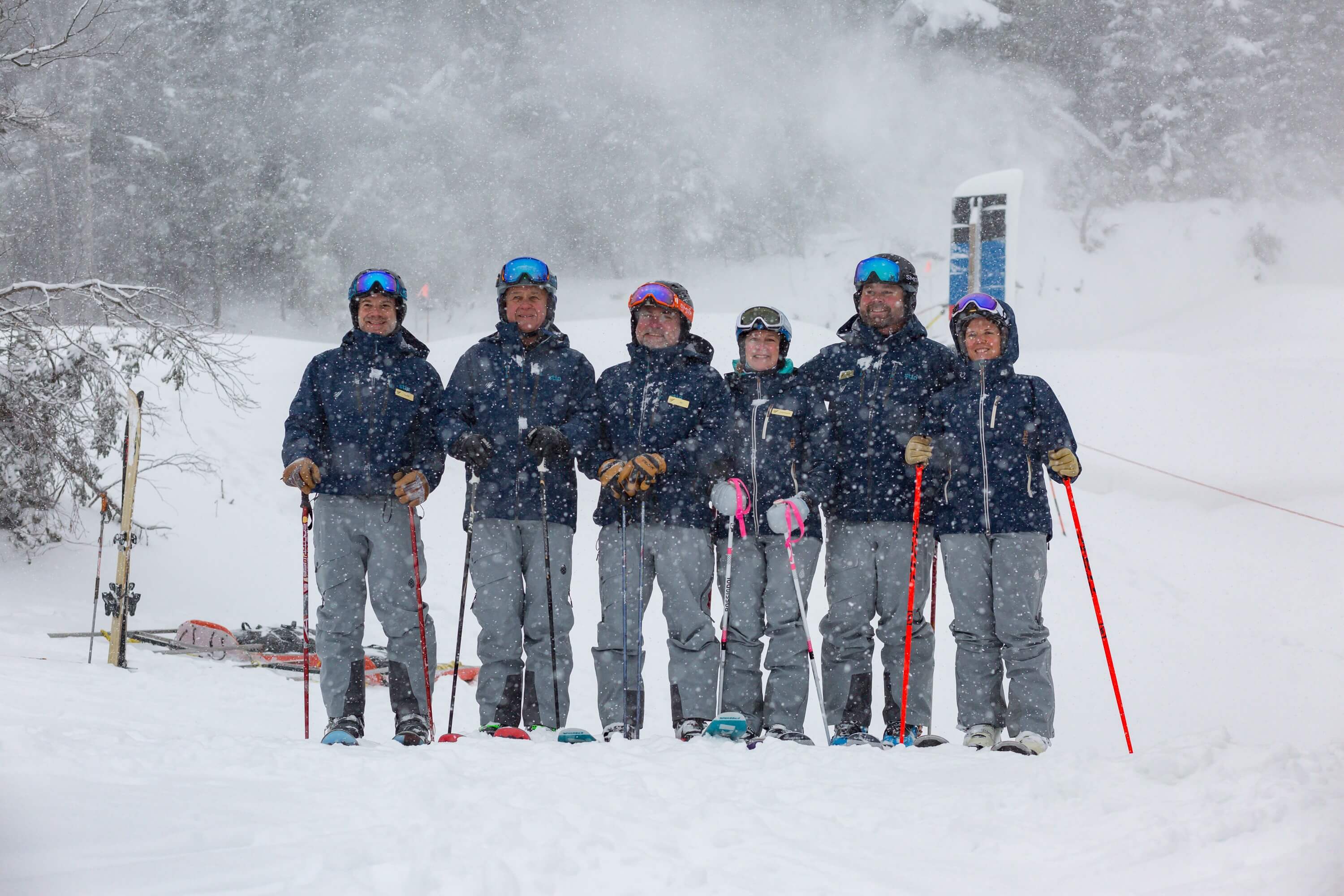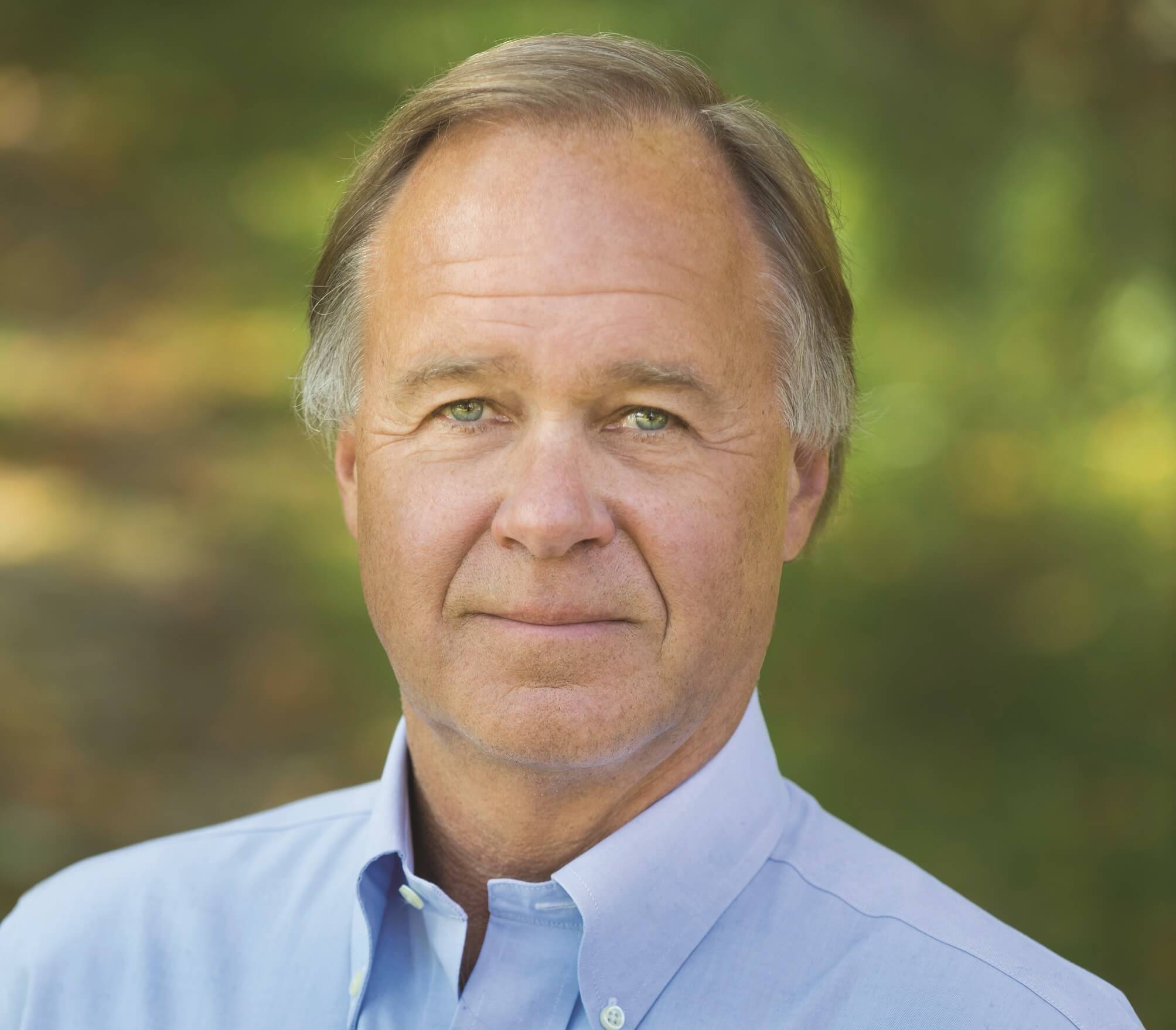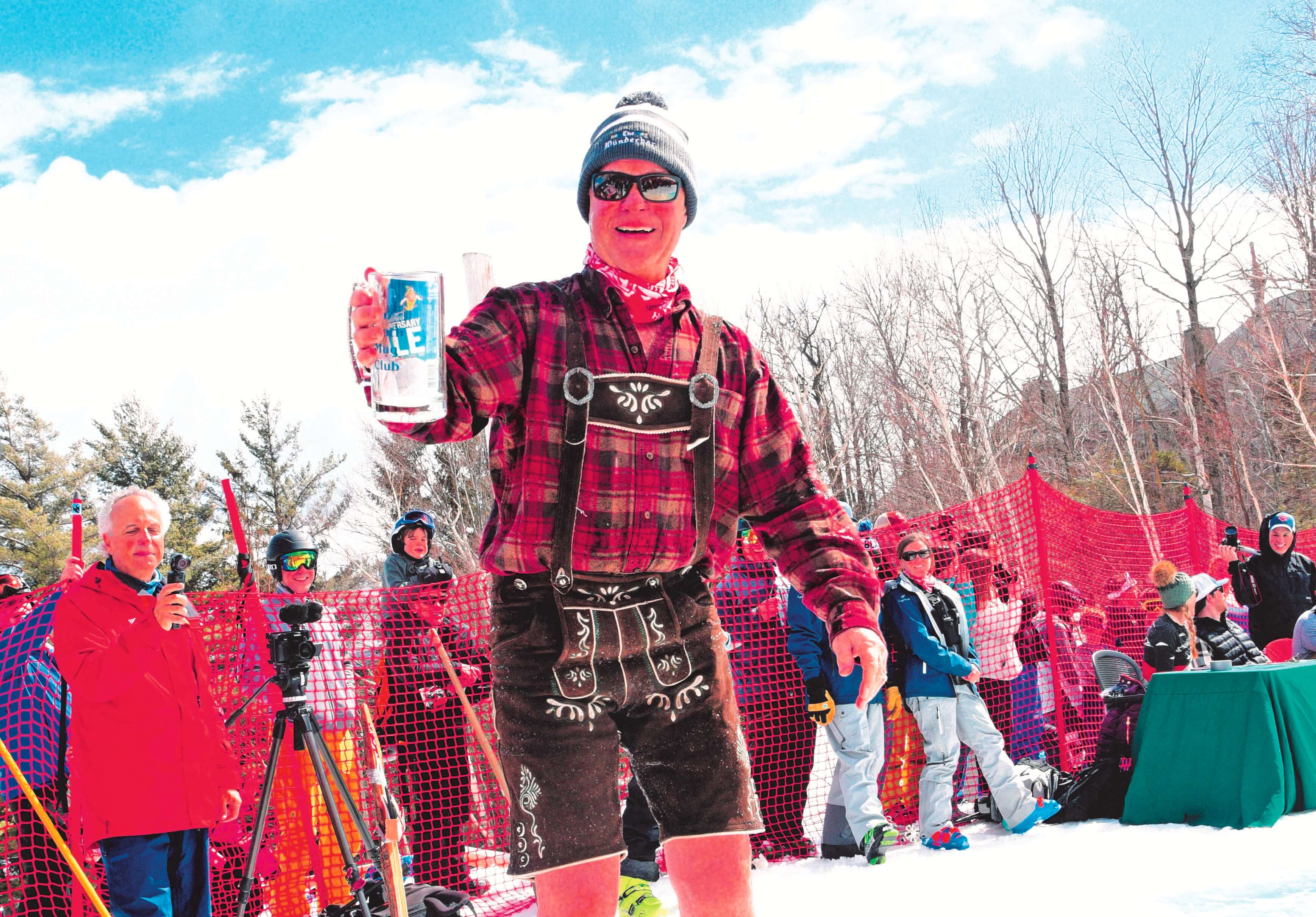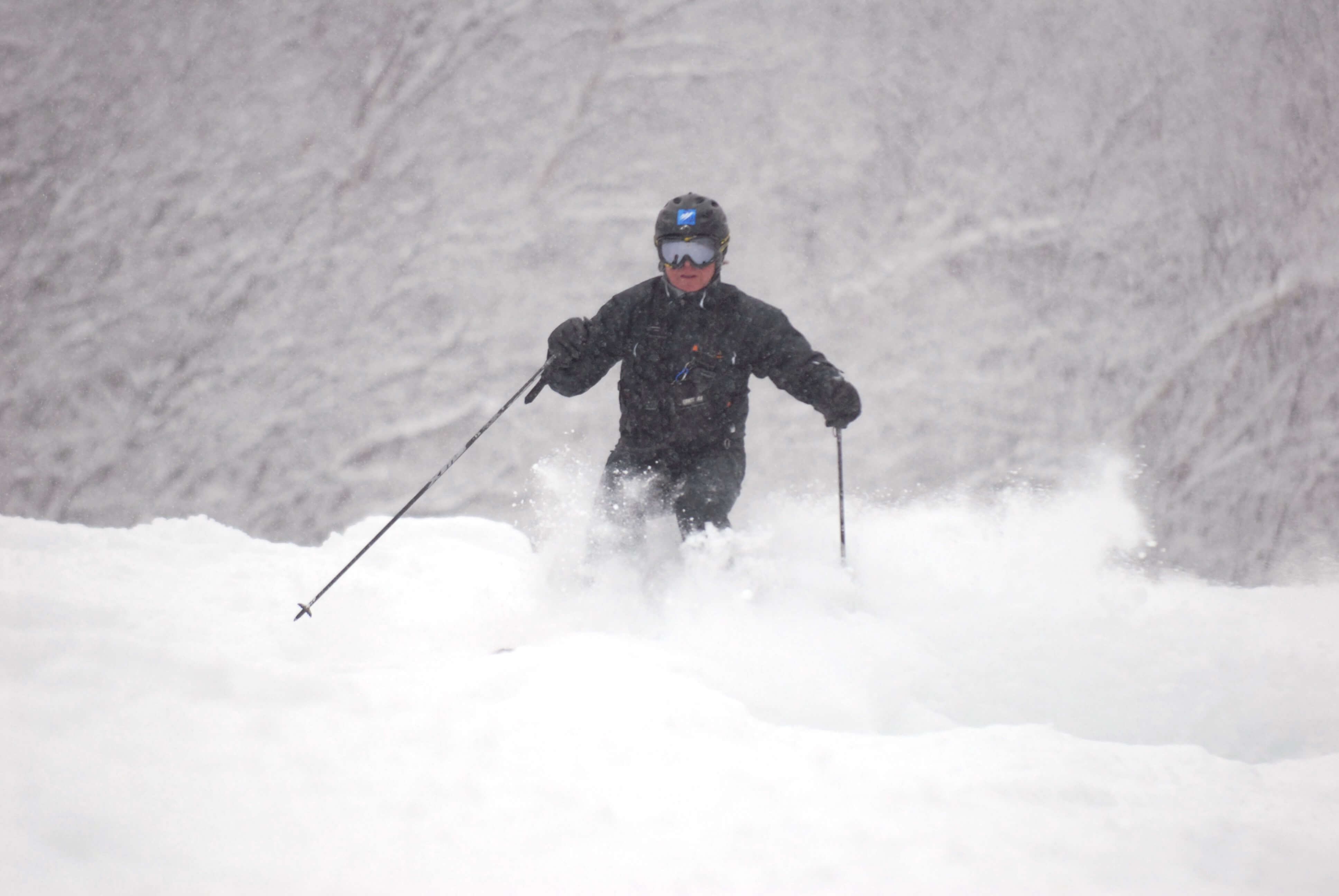NSAA 2022 Lifetime Achievement Award: Win Smith, Big-Picture Thinker
By: Heather B. Fried
NSAA’s Lifetime Achievement Award recognizes those individuals who have demonstrated an extraordinary lifetime commitment to NSAA and the ski industry and whose contribution will benefit the industry for decades to come. Join us in Nashville to honor Win Smith and recipients from the last two years during NSAA's 2022 National Convention & Tradeshow.

After spending close to 30 years in the financial sector at Merrill Lynch, Win Smith had a mid-career about-face when, in 2001, he decided to purchase and spiff up his home mountain, Sugarbush Resort, Vt. What may have seemed like a midlife crisis to his Wall Street colleagues at the time proved anything but an impulsive attempt to reclaim his youth. Quite the contrary, Smith accomplished his goal to transform the ski area into a destination mountain and then some, becoming an influential ski industry leader who manages to keep a pulse on the daily operations and the big picture trends affecting the sport.
Second Act
“I think the key thing is to recognize he came to the industry a little bit late in life, but he quite honestly engaged and exceeded everybody's expectations — everybody, I think, was truly impressed with what he did with Sugarbush,” said Michael Berry, NSAA’s former president and CEO. “He revitalized, reinvigorated and reenergized Sugarbush in a way that I think surprised everybody.”

Of those Smith impressed with the more than $70 million on-mountain and base area improvements over his nearly 20 years of ownership was Kelly Pawlak, who led a nearby competing ski area, Mount Snow Resort, before becoming NSAA’s current president and CEO.
“Sugarbush was that classic Vermont ski area with those windy trails and the vintage base lodge,” Pawlak said. “While he was there, he rebuilt it — now, there is a hip, modern hotel right at the base. He built a village [that] has everything from a bar where you can meet friends for a beer to a really nice eatery where you can get Vermont-featured ingredients. He took a strong interest in hiring top-notch culinary staff who received awards while he was there.
“So it went from this really cool kind of place that needed some TLC and was a bit overcrowded on busy days to this beautiful base village with lodging. I think that'll be one of the legacies he leaves Vermont.”
During Smith’s tenure, that vintage base lodge became three new lodges, and the ski area constructed the Clay Brook Hotel & Residences, Rumble’s restaurant, two new skier-services buildings, Rice Brook Residences and Gadd Brook Slopeside condominiums. Apart from its Sugarbush Village and Lincoln Peak base area transformation, Smith oversaw installation of seven new chairlifts, an overhauled snowmaking system that brought in energy efficient technology, and new programs like first tracks cat skiing.
“Win came into the industry as a skier with great business acumen,” said John Hammond, president and COO for Sugarbush. “He encourages everyone at the resort to be respectful, practice integrity, focus on sustainability, both fiscally and environmentally, and is genuinely interested in making skiing better. He does not look at other ski areas as competition but as partners in promoting skiing (as long as we were providing the better experience). His involvement in the ski community and around the state was a reflection of this. He could ski around on a weekend and say hello by name to hundreds of guests, the lift attendants, ski instructors and employees in all departments.”
Though Smith didn’t come from skiing, his background — at Merrill Lynch, he served as an investment banking associate, manager of financial analysis and budgeting, manager of compensation benefits, head of HR, various roles in strategy and marketing, manager of private wealth in the Northeast, and chairman of Merrill Lynch International — was about as ideal and well-rounded as they come, making him well-prepared to step in and lead. Even so, he came into Sugarbush humbly and dug into learning the business and supporting the team without micromanaging.
“Win brought both passion and a willingness to learn when he jumped into his Sugarbush venture with both feet, despite having no prior ski industry experience,” said Molly Mahar, Vermont Ski Areas Association president. “Relying on his depth of international business experience and learning the nuances along the way, he and his team modernized Sugarbush to ensure the long-term sustainability of the resort. This was critical for both the state’s economy and the central Vermont area, but Win also prioritized community involvement and philanthropy. He and Sugarbush have generously supported numerous local programs and charities over the years, making a real difference in the lives of many Vermonters.”
According to Mahar, Smith was also generous in sharing his forward-thinking perspective and considerable business experience, from both in and outside the ski industry, while he served on the Vermont Ski Areas Association board for many years. One of Smith’s most appreciated strengths among ski industry colleagues is his ability to take in a high-level view of bigger industry trends, including the legislative landscape in Washington, while keeping a pulse on the day to day at Sugarbush.
“He was progressive on issues like climate change and understood the importance of the political process, developing valuable relationships in the business and political communities that benefitted the industry,” explained Mahar. “In addition to running a ski area, Win was also an astute political watcher and often called me to discuss issues and strategies. Our representatives and senators like to hear directly from business leaders in the trenches, and Win always made time to talk with politicians or testify at the State House, helping to shape and improve policies for our industry.”
From Smith’s vantage point, his ability to pull his head out of ops and look around while also balancing learning the ropes and growing a ski area all comes with the territory. Irrespective of the industry, effective executives, in his estimation, “really can walk and chew gum at the same time,” he laughed.
“They have to manage day to day, but they also have to constantly think about, what's the next effort? What's the next initiative? What's the competition doing? How do we need to adjust?” he said. “You always have to be quizzical, you have to be a little bit skeptical, you have to ask questions, and you have to have the ability to take risks to drive things that allow you to innovate in order to keep ahead of the pack.”
Win-Wins
Smith came into the ski industry naturally adept on the financial front given his background. His time at Merrill Lynch also equipped him with political awareness and experience at lobbying and relationship-building among legislators — skill sets he sees as critical to skiing, a regulated industry that’s not necessarily understood in Washington.
“We have to make sure that we have the credibility and the contact with legislators to inform them about our issues, to bring them up to speed so that legislation can be drafted that isn't going to be deleterious to our operation,” he said. “And lobbying is, I don't know if I’d call it an art, but you have to know how to do it because legislators have their own needs. You really have to develop credibility with them; they have to understand that you're an honest broker. They're going to give you a much better opportunity if they really trust and respect you.”
A lifelong environmentalist, Smith has also been able to prioritize sustainability in the ski business. He recognizes that this industry needs to be a leader in this area out of sheer necessity. For one, younger guests — whom the sport needs to attract and retain for future stability — increasingly expect the businesses they choose to associate with to act responsibly. And then there’s erratic weather, a roulette where any given season could show up from week to week.
“The climate is accelerating negatively even faster than I would have thought,” Smith said. “Just use this winter as an example and the volatility we had: We started later, we had fewer windows of opportunity to make snow, we have had higher wind events, we've had rain, which we've always had but seems to be more frequent right now. So that clearly is one of the top challenges.”
In his view, ski areas should be on the lookout for win-win opportunities — low-energy snowmaking, for instance, saves money because it uses less power — to make progress both when it comes to economic as well as environmental sustainability. Sugarbush upgraded to an efficient snowmaking system back in 2014, cutting its energy consumption by nearly a quarter “without compromising either the quality or quantity of snow,” according to its website. Along those lines, the ski area is leading by example in their community by investing in clean solar energy, powering almost half of its operations and saving roughly $130,000 in energy costs annually.
Bench Strength
Another of Smith’s passions and areas of focus beyond ops is mentorship, something he’s seen lacking at the CEO level. When company leaders fail to train the right successors, or any successor at all, the organization can take a step in the wrong direction or wind up in a vacuum, according to Smith.
“I left Merrill because I thought the wrong leader was taking over,” he explained. “Unfortunately, I turned out to be correct, and he almost ruined the firm. So I guess that's made me very aware of preparing so that my successors are going to carry on the good things, not do things exactly as I did, but at least preserve the culture and build upon it.”
 As part of his successor strategy, Smith also believed in identifying young people with talent and motivating them to stay as a way to develop bench strength. He recommends taking a risk and engaging these young up-and-comers with a position that’s just a bit ahead of their capability “because good people usually perform,” said Smith. Likewise, he was also eager to make sure that women had an opportunity at Sugarbush, “in what had been a very macho industry,” Smith explained.
As part of his successor strategy, Smith also believed in identifying young people with talent and motivating them to stay as a way to develop bench strength. He recommends taking a risk and engaging these young up-and-comers with a position that’s just a bit ahead of their capability “because good people usually perform,” said Smith. Likewise, he was also eager to make sure that women had an opportunity at Sugarbush, “in what had been a very macho industry,” Smith explained.
“I was a realization of this leadership philosophy,” said Amber Broadaway, president/COO for Solitude Mountain Resort, Utah. “In my eight seasons working under Win, I earned the opportunity to take on additional departments, which at times were atypical combinations. For example, I went from risk and safety manager to adding on oversight of the resort’s guest services department. This was not a normal industry pairing, but Win saw potential in me and knew I wanted to grow my career. So he took the chance, and it worked out.”
When the opportunity to lead Solitude came up, Smith was one of the first people to reach out and encourage Broadaway to apply.
“He was honest, acknowledging it may be a reach position, but he knew I wanted it,” she said. “He had helped me build the skills for it, and he was my biggest supporter throughout the process.”
Even though it meant leaving a void at Sugarbush, Smith was delighted Broadaway landed the job.
“Having somebody from Sugarbush get that job, and [to] have another woman step up into leadership in the ski industry, I feel great about.”
Regardless of gender or age, influential leaders possess certain traits. Smith has been encouraged lately by a concentration on character over simply skills “because the best leaders I've known have had excellent character,” he pointed out. He qualified that as a good set of values, communication savvy, and someone who’s friendly (not necessarily friends) with everyone and respectful to the point where those being disciplined can still walk away with dignity. And on top of all that: a healthy helping of optimism.
“I remember one person saying to me he's never met a successful pessimist, and it really is true,” Smith said. “So you don't want to be a Pollyanna, but you want to set a tone for the organization, ‘We can do it, we can win. These are tough times, but we can get through them,’ and then help them understand how they can get through them.”
He thinks that setting the right tone in this moment, when the ski industry is facing so many seemingly insurmountable problems at once, looks like embracing an issue — be it diversity, climate change, staffing, housing or crowding — and being sure your words are backed by action that’s reflected and believed throughout the organization. Employees will see through BS and greenwashing immediately, according to Smith. On the flip side, they will also be able to spot a leader who is honest and genuine.
“Good leaders also can make mistakes, and the best leaders acknowledge [them],” he added. “The best leaders aren’t scared of making mistakes because everybody makes mistakes, and you learn from them.”
As Broadaway reflects on her first 10 months leading Solitude, she finds herself regularly channeling her “inner-Win.”
“He set a high bar when it came to cultivating relationships with the resort’s key stakeholders, communicating regularly with his team, community and guests — never faltering on his positive, solution-oriented approach,” she said. “I learned so much working for Win Smith and am eternally grateful for his mentorship and coaching. He made me a better leader.”
(Half a) Lifetime Achievement
If his 13 years on NSAA’s board were any indicator, Smith’s leadership principles were certainly successful there as well.
“He was incredibly helpful to those of us at NSAA who came to depend on him. He was thoughtful and savvy and it all blended together to make someone who could contribute in a significant way,” said Berry, who also thought Smith managed NSAA’s leadership transition in 2017 superbly and seamlessly.
Similarly, Pawlak described Smith as a well-connected and informed resource, masterful in his inquiries, who keeps you on your toes. She appreciated that he was always an involved NSAA board member. Even before she reported into him as the chair, Smith would check in on Pawlak after she made her way west to lead NSAA.
“When he became the chair, he wanted to know what was going on in detail — he was going to ask great questions, so he taught me to be more thoughtful,” said Pawlak. “He pushed for me to transition without saying ‘Kelly, you need to do this.’ It's just the way that he would ask questions to get me thinking.
“I think all great leaders do that — without pointing it out and telling you to do something, they help you with your weaknesses and develop them, hopefully, into your strengths,” she said.
While Smith is honored and flattered to be counted among NSAA’s Lifetime Achievement honorees, he joked that perhaps it should be a half-a-Lifetime Achievement Award to reflect the ski industry portion of his career. In all seriousness, he does think that coming over to the ski business, the NSAA board and Sugarbush as a relative outsider (no matter how much passionate skiers think they know) with a fresh set of eyes had many merits.
“I brought a different perspective having run a significant business at Merrill Lynch,” he pointed out. “I managed a lot of people, I managed a complex organization. So I really [drew] upon what I learned at Merrill and brought it into the management of Sugarbush.”
Though it feels prophetic, Smith didn’t have any premonitions in early 2020 when he sold Sugarbush to Alterra Mountain Company. Throughout the tough couple of years that followed, he’s remained on as an advisor to the company, a role he defines as “kind of a one-way call,” he said. “I'm not meddling and micromanaging. But if they want to have my thoughts and historical perspective and a consult, then I'm available for that.”
For this, Rusty Gregory, CEO for Alterra Mountain Company, has been grateful.
“Win has been instrumental in Alterra’s growing understanding of Sugarbush,” said Gregory. “This continues to be critical because, frankly, we still have a great deal to learn from him about the resort he loves so much. He has been gracious with his time and expertise on everything from snowmaking to lift systems to base area development and everything in between. Most importantly, Win understands at a deep level that the ski resort business is first and foremost about people. His insights about the guests who frequent the mountain, the employees he mentored and built into high performing teams, and the citizens of the resort’s surrounding community continue to be essential — and in many ways, are assets that, thanks to Win, came with our acquisition of Sugarbush.”

Hammond is also looking forward to Smith “continuing to help nudge us in the right direction, and of course, skiing more than 100 days a year,” he said, speaking to one of Smith’s prime directives from Sugarbush that he’s carrying over into retirement with aplomb.
“I've had 86 days of worry-free skiing,” Smith bragged, on the verge of logging days 87–100 during a Big Sky, Grand Targhee, Jackson Hole, Solitude, Yellowstone Club adventure. “So I don't worry when the lift goes down. I don't worry when it rains over Presidents weekend. It sort of is a different feeling after 20 years.”
And a well-deserved feeling at that.
Read more about Win Smith in NSAA Journal's Fall 2019 issue